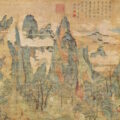Of Grievance and Grief: Marilyn Chin
I first encountered Marilyn Chin’s poetry through a video clip from the San Diego Border Voices Poetry Festival. In the clip Chin—with her wild wavy hair and red lipstick—faces the camera and recites “Blues on Yellow,” the opening poem from her third volume Rhapsody in Plain Yellow. The music of the poem recalled the English nursery rhyme “Sing a Song of Sixpence.” But the racialized violence of its content, wherein Chin implicates herself and her poetic craft as active participants, was fascinatingly odd and discomfiting:
Something’s cookin’ in Chin’s kitchen, ten thousand yellow-bellied sapsuckers
baked in a pie.Something’s cookin’ in Chin’s kitchen, ten thousand yellow-bellied sapsuckers
baked in a pie.Something’s cookin’ in Chin’s kitchen, die die yellow bird, die die.
Why in the world is an Asian American woman poet blending child-like rhyme and rhythm with such a sinister narrative, only to say something about race? Her assurance and saucy poise—straight posture, even stare, curled lips, and ironic tone—begged questions of speaker and perspective. Marilyn Chin the Asian-American woman clearly is speaking the poem, but whose perspective are her words meant to adopt, especially in the stanza’s final imperative? In parroting hate speech, do her words mock and challenge racists? Or are the words turned inward: a group’s masochistic internal monologue? Could she be commenting as a third party? I’m still wondering.
Reading Rhapsody in Yellow was a much-needed moment of recognition. I had immigrated to the U.S. from the Philippines in my teenage years, and have now lived longer in my adopted country than in my native homeland. At the time I came across Chin’s poetry, I had almost no exposure to works by Asian American writers. It was nothing short of revelatory. Chin offers encouragement to draw upon the referents and experiences of immigration, and of life as an immigrant writer. She does this regardless of how incongruous and alien these themes and images might be when compared to the dominant American models. Her work blends myth and literary traditions from both continents, mining as much from “high-brow” esoteric as from popular culture, exploring ancient and modern themes, waxing lyrical or bawdy with a keen wit and sense of the truth-telling effects of irony.
What impresses me most of all is that she’s not afraid to criticize both the societal power structures and those who exploit them. Chin’s hybrid approach seemed so original to me then because I was seeing it for the first time. But it also felt very familiar. It embodied the tensions that had been marinating within me, unable to find expression. In a 2002 interview with the journal Meridians, Chin said that she wrote Rhapsody to vindicate women’s suffering, especially her mother’s:
I believe that my mother was oppressed by my father and the feudalist patriarchal Chinese past, which deprived her of her voice, which made her deprive herself of a voice. […] I write poetry to give my mother justice, and by extension, to give justice to others like her who were victimized and misunderstood.
Indeed, Rhapsody gave voice to the depth and the complications that cultural multiplicity imposes: the difficulty of continuously having to negotiate conflicting inheritances, expectations, and imperatives; the guilt of being unable to retain a memory fully intact; the pressure to assimilate while perpetually being viewed as foreign; and the burden of historical prejudices and marginalization. I’m sure this rings true for many other first- and second-generation immigrants as well.
Chin’s working-class immigrant family settled in Portland, Oregon, after moving from Hong Kong, where she had “known hunger and dispossession.” Her earliest childhood memories are of her illiterate grandmother reciting Chinese poems to her from memory. Chin studied and translated ancient Chinese poetry at the University of Massachusetts at Amherst then completed her MFA at the University of Iowa Writer’s Workshop. She has just retired as a professor at San Diego State University. Considering the marginal status of Asian American poetry today, Chin’s achievement is highly remarkable. Perhaps most surprising is that her stature continues to rise although she has never wavered from self-identifying as a political poet (the death-knell of more than one poet’s academic career). As she says in MELUS: Multi-Ethnic Literature of the U.S.:
Of course, I believe that as a minority writer in this country, I must be an oppositional force. This is expected of me, no? To shake things up? My work is always classically posed on the basic level (a sound foundation); then, after that, it’s my job to speak out. How many short brown girls in this world get to speak? So, while I have the page, I must rattle some cages.
Critic Dorothy Wang suggests that Chin’s mainstream acceptance results partly from the way her politics often become “missable” by her deployment of irony. It seems to me, however, that the opposite is true. Chin’s irony, rather than disguising meaning, renders the political force more vicious. It marks a wicked playfulness, a kind of writerly enjoyment that demands intensified effort on the part of the reader. Either the audience participates in the political enlightenment, or they become trapped in a joke of their own oblivious making.

Hard Love Province
by Marilyn Chin
W.W. Norton, 2014
$24.95
All these elements are alive and well in Chin’s newest volume, Hard Love Province. Although her work still very much emerges from an engagement with politics and the interrogation of power relationships, her purpose does seem to have shifted slightly. The new collection moves away from grievance and aggression toward grief and a sense of community through poetry, especially among women. The book is divided into four untitled sections. Sections I and IV consist primarily of elegies. Section II groups the book’s more overtly political poems together. And section III traces a women’s literary lineage and maps a future direction.
The elegies that bookend this volume are written to those who inspired her writing. This includes past romantic partners and writing mentors, as well as forebears such as Adrienne Rich, Donald Justice, and Gwendolyn Brooks. They set the tone for the volume, spurred by death and grief, dealing with existential questions about personal and literary purpose. Despite that, the collection emits an certain quality of renewal, perhaps one that is only possible in the liminal spaces of grief. As Chin notes in one poem, “A deathblow is a life blow to some.” Despite the fact of loss a profound appreciation and gratitude emanate from these poems, a feeling that can only be described as love. In fact nearly all the poems in the collection could be read as love poems. They yearn for and celebrate love in its multitude of forms and objects: for another, for oneself, for art, for language, for sex and sexuality, for womanhood, for social justice, and even love for the process of loving and giving back.
This new theme does not mean that Chin has gone soft. Her indictment of hegemony and imperialism is ever-present, as bound up with the love poems as with any others. But now, perhaps as a reciprocal influence, the political critique seeks out ways for those hegemonic systems to be countered by love and its transformative powers:
If you hate
There will be a smoldering silence
If you love
There will also be
A purifying furnace
Chin demonstrates that the identity of the self is mediated by a triumvirate of considerations: race, class, and gender. Most urgent and powerful among the works are those that express Chin’s feminist views and exhort women to band together and fight patriarchal dominance and control. She conflates her sexual and literary virility, using her prowess as a lover and writer to call out the sins and hypocrisies of patriarchy. These range from the mocking appropriation of “women’s work” (“Hell no Dude-bro! You think you own this poetry”) to ageist double standards (“What they say about a woman at forty-five / Too late to live too soon to die”) and the denial of female sexual and economic autonomy:
Such entitlement my prickly little prince
Waving a pistol and a crumpled Ben Franklin
Don’t you know I’m a citizen of my own bed
I paid for my passage I owe you nothing
The speaker flaunts her promiscuity and poetic accomplishment with stereotypical masculine bravado to assert her equal right to be “proud of her lust.” She exaggerates her own sexual urges to re-enact the patriarchy’s predatory ways:
Hold on to your boy soldier on the moonlit path
I am an urban cougar on the sunset prowl
Once I take his nape in my bloody mouth
He’ll beg and moan and succumb to God
Chin’s regular insertion of her name in her work belies the New Critical tradition of referring to a lyric’s speaker. It encourages direct attribution of Chin’s prolific use of the personal pronoun. Adrienne McCormick argues that this technique forces a constant reconsideration and mindfulness of biographical contexts: as Chinese American, immigrant, and female. Irene C. Hsiao concurs that Chin’s use of “I” becomes a “radical act,” especially in the mode of the confessional lyric, where it becomes an assertion of identity that undermines static stereotypes:
The issue of reclaiming the I finds its formal equivalent in the Asian American writer’s negotiations with poetry, especially the lyric, the genre that spotlights the individual against a relative absence of narrative.
It also heightens Chin’s unapologetically feminist stance, making her directly accountable for the assertions and demands in her work. As a responsible guardian of feminist legacy and mentor of future women authors, Chin calls for autonomy in “Cougar Sinonymous” not only for herself but for a community of women as the dare below implies:
Throw my girl into the river she won’t drown
Like her mother before her and her mother’s mother
Stubborn reed hollow at both ends
She’ll whistle and hum and float into dawn
The theme of mentorship takes on greater importance in Hard Love Province because of the elegies. Chin thanks many of her predecessors for their inspiration. The poem “Summer Sleep (after Meng Haoran),” dedicated to Donald Justice, stands out due to one ambivalent dream sequence in the poem:
In dream I am ten napping in the Master’s house
My single bed a one-girl coffinToo tight! I cry my feet can’t fit!
He scowls and sighs scorns my mediocrity
Although the tone is tender and admiring (especially in the student’s desire to please her teacher and overcome her “mediocrity”), Chin borrows Audre Lorde’s phrase “the Master’s house” to suggest not only a love-hate relationship between student and teacher, but a hegemonic relationship that paints Justice as a symbol of institutionalized power. It triggers an anxiety of influence in the fledgling poet who perhaps feels pressured to adopt an inauthentic voice. In an interview, Chin describes one exchange where Justice meticulously critiques her use of the ballad form while ignoring her reference to dog-eating as a metaphor for the Chinese Revolution: “I left his office feeling the weird joy of both being validated and misunderstood.”
The dissonance in that passage between the lyric melody and admiration against the macabre image of a young woman forced into a coffin can be read as the conflict between form and content. The “fit” between a minority writer’s concerns—cultivating “authenticity” of voice, questioning assimilation, resisting appropriation—and their mode of expression—the “Master’s tools” of writing in the English language and using Western poetic forms—is always a struggle. Even as she incorporates non-Western models, Chin highlights the impossibility of total reconciliation. The language that a writer of color employs is necessarily informed by histories of displacement along with the modes of expression available in her non-native English.
Despite demonstrations of its limits, Chin sees poetry as the ultimate form of tribute and expression of love. Whenever she finds herself lapsing into dark, existential explorations (“Ditty’s become a dirge / Mocking our impermanence”) and concluding poetry’s ineffectiveness against mortality and suffering (“I hum and stroll / And contemplate a poem / While young boys are dying / In West Darfur”) she makes a hard about-turn, revealing the illumination and comfort that poetry brings. Whereas Rhapsody in Plain Yellow can be seen to speak from a place of suffering and resentment, Hard Love Province speaks from a more mature place of understanding and compassion. Take, for example, the following stanza from “Two Inch Fables”:
Tear the fly from the flypaper, let him die
Take the roach out of the motel, let him fly
The dead dingle on the fence makes amends
Free the cock from the sacrifice, free the hen
Let the orphans feed, set the widows free
Teach a killer how to cry
We must love one another or die
Love one another or die
The moral, to “Love one another or die,” is taken from Auden, a line that Lyndon Johnson famously incorporated into the “Daisy” political ad. It strikes a stark and ironic contrast to the imperative from “Blues on Yellow”—“die die yellow bird, die die”—and shifts the focus away from rebellion and divisiveness, if not from politics. The images here construct a dark continuum, from victim to killer, all equally worthy in the end. If it is true, as Chin writes, that human destiny is made up entirely of “war grief maggots nada” then perhaps the only antidote is self-realization writ large. Love is a more powerful and generative force for Chin than it ever was for Auden. But then again, so was poetry: it was Auden who also wrote “poetry makes nothing happen.” He obviously never read Marilyn Chin.






